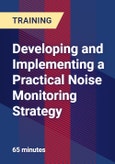Why Should You Attend:
This webinar starts with basic knowledge of sound and noise as well as its effects on hearing and exposure standards. It uses this basic knowledge to help in understanding the instruments used in performing noise monitoring and how best to use them in developing and implementing a practical strategy for performing noise monitoring. General categories of noise monitoring equipment presented and discussed include dosimeters, sound level meters and octave band analysis. The uses and application of these instrument types in performing noise monitoring for personnel protection is the primary focus of this webinar.Included in this discussion are the effects of the time variability of noise sources and varying worker job duties in selecting suitable populations for exposure monitoring. This will aid in the development of a cost-effective yet practical strategy for monitoring occupational noise consistent with prevailing standards of practice.
This session will benefit all functional groups who have the need to understand the basics of noise, hearing loss and hearing protection as well as those responsible for noise monitoring for personnel protection and engineering control design.
Areas Covered in the Seminar:
- What is noise?
- How does noise affect hearing?
- How is noise measured?
- What are the exposure limits for noise?
- How to assess occupational exposure?
- Instrument types - strengths and weaknesses.
- How to select a sample population?
- Monitoring methods.
- Interpreting your monitoring results.
Who Will Benefit:
- Industrial Hygienists.
- Safety Professionals
- Hazardous Materials Professionals
- Monitoring Technicians
- Operational Managers/Supervisors
- Noise Abatement Design Engineers
Course Provider

Robert Collins,









